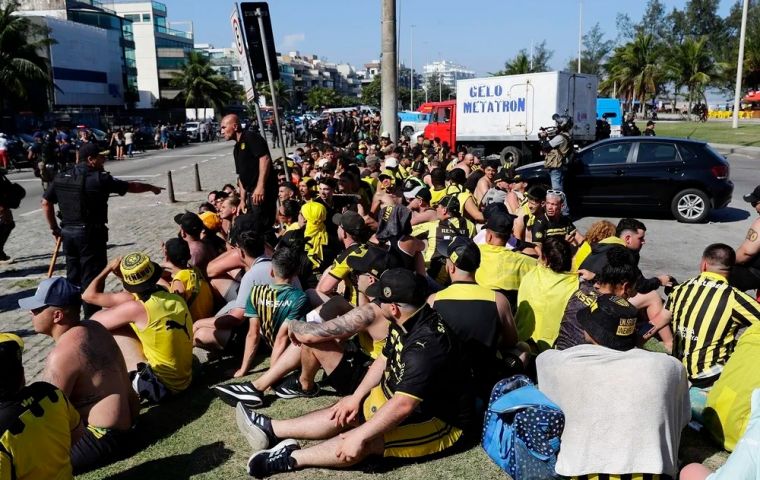MercoPress. South Atlantic News Agency
Brazilian Police do it again: 20 Peñarol fans remanded in Rio
 “We were defending ourselves from an attack,” a Peñarol fan said about the clash with supporters of Rio teams Botafogo, Flamengo, and Fluminense
“We were defending ourselves from an attack,” a Peñarol fan said about the clash with supporters of Rio teams Botafogo, Flamengo, and Fluminense A total of 21 supporters of Uruguayan football club Peñarol were arrested this week in the Brazilian city of Rio de Janeiro before a match with Botafogo and charged with racism, damage, and criminal association. “Nobody justifies criminal behavior, but this was a scandal,” said Peñarol's lawyer and former President Jorge Barrera. Brazil's criminal procedural legislation contemplates “these regrettable but foreseeable results,” he added.
“Of the people who were arrested, one has been released, who in the next few hours will return to Uruguay; the rest were remanded. This is because since the trial is being held in Brazil, the possibility that there may be some precautionary risk is an important argument,” Barrera also explained.
Brazilian Police is notorious in South American football for siding with their local teams, in some cases even targeting the players of the visiting team. According to Barrera, the Police even encouraged locals to attack the Peñarol supporters, assuring them that “no Brazilian would be arrested,” which given Brazil's background is more than credible. A Peñarol fan said upon arriving back in Montevideo that Brazilian police beat the men and threatened to rape the women.
Barrera also pointed out that the Uruguayan fans “went to that meeting point because the Brazilian Police was the one who determined that it was the safest place. The ”Carboneros“ clashed with fans of Rio de Janeiro teams Botafogo, Flamengo, and Fluminense at the meeting point in the Recreio area.
”Videos are circulating throughout the two countries where a policeman is seen promising fans of other local teams that were there not to make trouble, that no Brazilian was going to be arrested,“ he added. ”That, anywhere in the world, is a crime. A blank check for them to attack. I ask myself: if someone is with women, children and they are being attacked in this way, how would they act?“ he wondered.
A Peñarol fan told Uruguayan TV that they were outnumbered by people stemming from a favela. But ”the police, instead of taking them out, started throwing gas and shooting: “We were defending ourselves from an attack.” Then when the first incidents occurred, people who were playing volleyball on the beach pulled out 9 mm guns. The Peñarol fan added that the brutality was not only before the arrest but also during the procedure. He also mentioned that the police let the press in to show that “everything was fine” and when the journalists left, they threw pepper spray at the detainees “every half hour [or] forty minutes”.
The Uruguayan lawyer also argued that racism is punishable “when someone uses it to incite hatred and contempt on the basis of race, ethnicity or religious beliefs” which was not the case in Rio de Janeiro when the Peñarol fans were literally under attack. Whatever they might have yelled was out of anger and “impotence” because nobody on the other side was to be arrested, he explained.
Of the 230 Peñarol fans originally apprehended, 210 were released. “It was an embarrassment on the part of Brazil. [Argentine clubs] Lanús goes there and has problems, Racing, River, Boca, and all of them have problems. Isn't it time they questioned if they are the problem?”, Barrera insisted.
Brazilian media reported that Peñarol fans caused several outrages and a kiosk owner said that his shop was raided and robbed by Peñarol supporters, which may be true. But by 230 people?
The incident prompted the attention of Uruguayan Foreign Minister Omar Paganini who regretted in a press conference the “very strong aggressions” suffered by the Peñarol fans in Rio. ”Our consul there (Santiago Muñiz) has been very active from the very first moment,” he also pointed out.




Top Comments
Disclaimer & comment rulesCommenting for this story is now closed.
If you have a Facebook account, become a fan and comment on our Facebook Page!